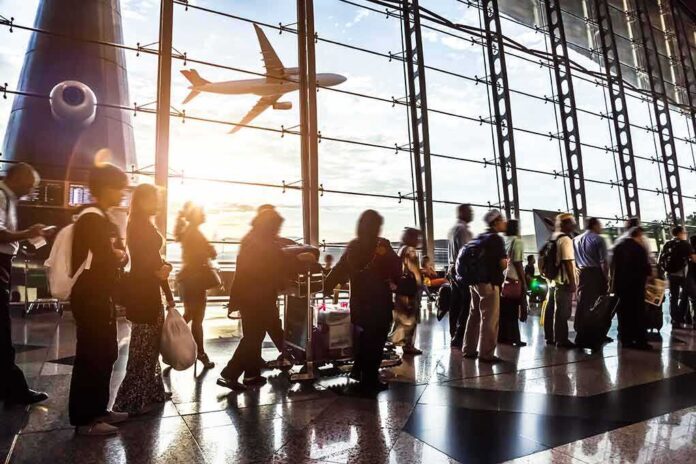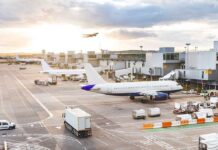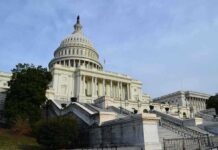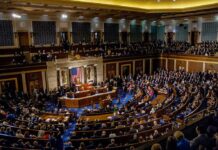
Newark Liberty International Airport descends into travel chaos as air traffic controller shortages and runway repairs cause five-hour delays and cancellations, with passengers stranded and airlines refusing to provide accommodations.
Key Insights
- Newark Airport is experiencing severe disruptions with nearly 20% of flights canceled and over 40% delayed, with average delays reaching 381 minutes for arriving flights.
- The crisis stems from a perfect storm: critical air traffic controller shortages (FAA is short about 3,500 controllers nationwide), equipment failures, and a $121 million runway rehabilitation project closing one runway until mid-June 2025.
- Transportation Secretary Sean Duffy has acknowledged “cracks in the system” and announced plans to offer retention bonuses, pay raises for new controllers, and expedited hiring processes.
- The FAA has temporarily shifted Newark’s airspace management to Philadelphia, but equipment issues at that facility have compounded the problem.
- United Airlines has experienced significant disruptions due to these combined factors, with flight diversions forcing passengers to miss connections without hotel accommodations.
A Perfect Storm of Issues Grounds Newark Operations
Newark Liberty International Airport, one of the nation’s busiest travel hubs, is experiencing unprecedented operational challenges as multiple critical issues converge. The airport is currently operating with severely reduced capacity as one runway undergoes a $121 million rehabilitation project expected to continue until mid-June 2025. This construction has forced the airport to operate with just one takeoff and landing location at certain times, drastically limiting the number of flights that can safely operate.
Compounding these infrastructure limitations is a severe staffing crisis within the Federal Aviation Administration. The agency is currently short approximately 3,500 air traffic controllers nationwide, forcing existing staff into mandatory overtime and six-day work weeks. At Newark specifically, controllers have been temporarily relocated to Philadelphia’s air traffic control center due to staffing issues, creating a domino effect of delays throughout the region’s airspace.
A shortage of air traffic controllers is causing problems at Newark Airport near New York City, which could see more flight delays as the busy summer travel season approaches. @trevorlault reports. pic.twitter.com/lcou9HsAOa
— Good Morning America (@GMA) May 2, 2025
Equipment Failures Add to Mounting Delays
Recent equipment malfunctions have further exacerbated Newark’s operational nightmare. A ground stop was implemented due to equipment issues at the FAA airspace operations center in Philadelphia, which is currently managing Newark’s airspace. These technical failures, combined with staffing shortages and runway limitations, created a perfect storm resulting in arriving flights delayed by an average of five hours. For travelers, this has meant missed connections, extended waits, and significant frustration.
The situation reached a breaking point when nearly 20% of flights were canceled and over 40% delayed. United Airlines has been particularly impacted, with numerous flights diverted to alternative airports when they couldn’t land at Newark. Adding insult to injury, many affected passengers report that airlines aren’t offering hotel accommodations, citing the FAA issues as being beyond their control.
Government Response and Long-Term Solutions
Transportation Secretary Sean Duffy has acknowledged the severity of the problem and outlined plans to address these systemic issues. The Department of Transportation is planning to offer retention bonuses to encourage controllers to delay retirement and to incentivize transfers to harder-to-staff locations like the New York metropolitan area. Additionally, pay raises for new controllers and efforts to expedite the hiring process have already been announced.
The current minimum flight requirements at New York City-area airports have been extended through October 2025 due to ongoing staffing shortages. Duffy also plans to announce a new initiative for modernizing air traffic control infrastructure and equipment, addressing the outdated systems that have contributed to recent failures. However, with the runway rehabilitation continuing for another year and the controller training pipeline taking years to produce fully certified personnel, Newark passengers should prepare for continued disruptions.
Advice for Affected Travelers
For travelers with upcoming flights through Newark Liberty International Airport, experts strongly advise double-checking flight status before heading to the airport. With the combined challenges unlikely to resolve quickly, passengers should prepare for potential disruptions by building extra time into travel plans, considering alternative airports when possible, and understanding their rights in case of significant delays or cancellations. The Newark Airport’s official communications have acknowledged these difficulties but offered little immediate relief for affected passengers.
Sources:
Newark airport experiencing cancellations, delays once again due to staffing, construction issues
FAA staffing issues, runway repairs force hundreds of flight cancellations, delays at Newark airport


 News Editor
News Editor




























